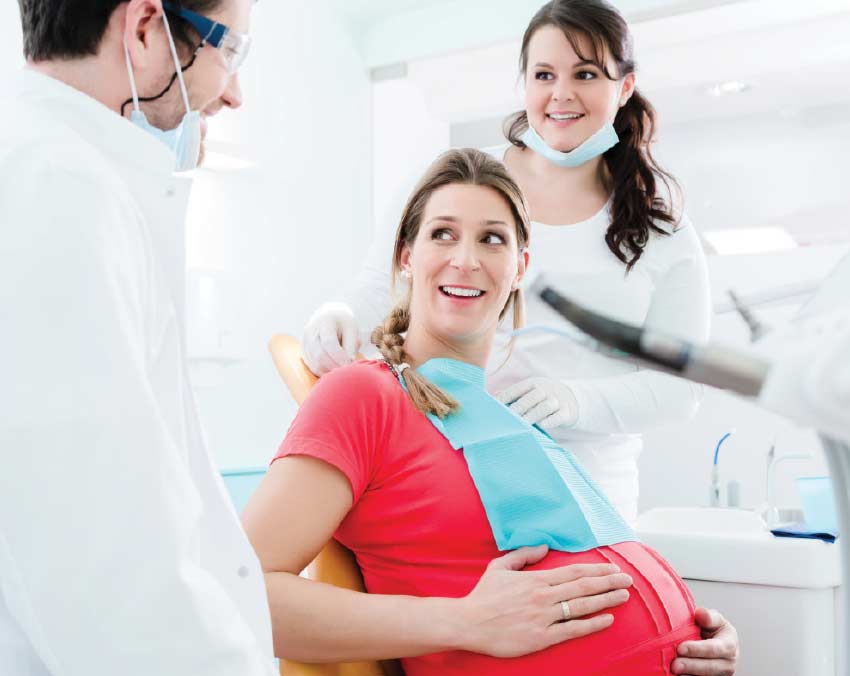Dental Care During Pregnancy
Maintaining good oral hygiene is more important than ever
Dear Doctor,
Now that I'm pregnant, I'm concerned about how the choices I make could affect my developing baby. Is it still safe for me to go to the dentist?
Dear Mona,
First of all, congratulations! The next few months are sure to be an exciting time, and it's easy to understand why you would want to be extra careful right now. But there's no reason to worry about routine visits to your dentist: Several major medical organizations, including the American Congress of Obstetricians and Gynecologists (ACOG) and the American Dental Association (ADA) recommend that expectant mothers continue getting regular dental exams and cleanings. My research shows that expectant women who receive dental treatment face no more risks to their pregnancy than those who don't — even when that treatment involves local anesthesia. In fact, visiting the dentist is even more important now, because keeping up your oral health is key to maintaining your overall health during this special time.
The Pregnancy Effect
The changing levels of various hormones during pregnancy sometimes causes problems for your teeth and gums. Some of these changes are easy to see. For example, food cravings that cause you to eat more carbohydrates may make you more likely to have tooth decay; and recurrent morning sickness can throw off your oral hygiene routine.
 |
Changing hormone levels during pregnancy can also make you more prone to certain dental problems. One relatively common issue is pregnancy gingivitis, a gum infection that causes tender, swollen, and bleeding gums. This is typically seen between the second and eighth month of pregnancy, and is thought to occur because hormonal changes make your gums more sensitive to plaque bacteria.
Pregnancy gingivitis affects around four in ten expectant women at some point — and if you already have gum disease, being pregnant can make it worse. Left untreated, gingivitis can develop into a more severe bacterial infection called periodontal ("peri" – around; "odont" – tooth) disease. That's a major reason why regular dental checkups and professional cleanings are especially important during pregnancy.
In addition to worsening your own gum disease, some studies have suggested that the oral bacteria associated with periodontal disease are able to cross the placenta — the organ that helps nourish and maintain the developing fetus. This is thought to trigger an inflammatory response in the mother, which may increase the risk of complications during pregnancy. While the exact mechanism isn't known, research shows that pregnant women with severe gum disease are much more likely to deliver premature and underweight babies than pregnant women with healthy gums. So if you notice swollen, bleeding gums or any other changes in your mouth, be sure to see your dentist.
Another oral condition that affects around 10 percent of pregnant women is called "pregnancy tumors." These large, red swellings can form on inflamed gum tissue, but are almost always benign (not harmful). They generally result from a localized inflammatory response to an irritant, such as plaque or trapped food particles. These lumps can be painful, and may make it difficult to speak or chew properly — but they generally disappear after baby's birth. If they are causing you problems during pregnancy, ask your dentist about treatment options.
Elective vs. Essential Treatment
When it comes to elective treatments, such as cosmetic dental work, it might be best to put them off for a few months. However, as far as essential treatments — such as root canals or emergency dental procedures — there's some good news: Most dental procedures can be safely done during pregnancy. Our study, published in the Journal of the American Dental Association in August 2015, found it was safe for pregnant women to have dental treatments including tooth fillings, root canals, and extractions, even if these require local anesthesia.
But there's one thing that is essential: Be sure to tell the dental office if you are pregnant, and how far along you are in the pregnancy, when you make your appointment. Let your dentist know about any medications or supplements you are taking, if you have received any special advice from your obstetrician, or if you have a high risk pregnancy. Your dentist will be able to design a treatment plan that's best for you based on this information.
You have an important role to play in maintaining oral and overall health during pregnancy. Eating a nutritious, balanced diet and avoiding unhealthy habits is more important than ever. It's also important to schedule regular dental visits, and to maintain good oral hygiene at home. Talk to your dentist or hygienist about adjusting your home-care regimen to suit your particular needs. They will be happy to guide you, and can be valuable partners in keeping you healthy and comfortable during your pregnancy — and afterward.



